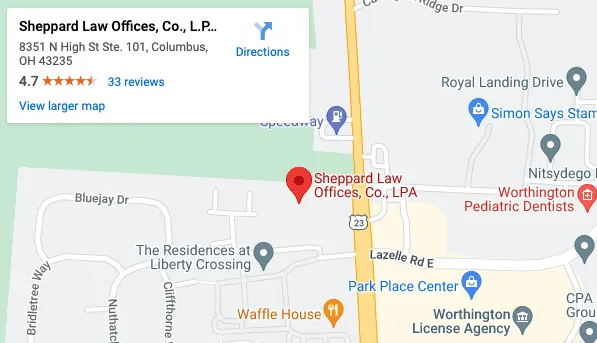What is full estate administration in Columbus, OH? How long will it take? What happens if there is no will? Our credible Columbus estate planning lawyers at Sheppard Law Offices can help you answer the questions that you may have surrounding estate administration.
The estate administration process can be difficult to understand, as it touches on several important aspects of estate planning. The whole process can be overwhelming and stressful without a basic understanding of what a full estate administration is all about.
Contact our law office now and schedule a free consultation to learn more about how we can help you plan for your future.
Why Do I Need an Estate Administration Lawyer in Ohio?
The process of estate administration is a challenging but necessary obligation after someone dies. If you’re administering an estate, you have a lot of responsibility to family members, loved ones, and the court. Our trusted Columbus estate administration attorney can help administer the estate and avoid common pitfalls when going through the probate process.
At Sheppard Law Offices, we are committed to:
- Providing legal advice to executors, administrators, or personal representatives through the entire estate administration process.
- Administering the needs of all sizes of estates, from simple retirement accounts to complex business valuation and succession planning.
- Verifying the will through the probate court, collecting all assets, determining liabilities, paying creditors, filing estate taxes, and distributing remaining assets to heirs.
- Explaining what is involved in the probate process and efficiently handling all legal aspects of estate administration in Ohio probate court.
Our estate planning law firm has extensive experience and an in-depth understanding of Ohio law and the estate administration process. Schedule a free consultation with us today to discuss how we can help you manage and administer the legal affairs of an estate in Ohio.
What is Full Estate Administration?
Estate administration is essentially the process of winding up an individual’s personal and financial affairs after they die and transferring assets to future generations according to established wills or estate plans. All estates are not alike and can differ for several reasons.
An estate may be testate (with a will) or intestate (without a will). The ownership and nature of assets may vary, and so does the procedure for transferring those assets. Our knowledgeable Columbus OH, estate planning attorney can help you ensure that the whole estate is administered correctly and according to the law’s requirements
In Ohio, an estate will have to go through full administration if the value of the probate assets is:
- Over $35,000 if there is no surviving spouse
- Over $100,000 if there is a surviving spouse
How Will an Estate Be Administered?
The number of heirs or beneficiaries, the size of the estate, and the complexity of the will and estate are a few factors that could determine the process used to administer the estate. The probate process for a full administration is particularly onerous. It does require steps to be taken in a certain order and within certain deadlines. Our competent Columbus estate planning lawyer can guide you throughout the process of full estate administration.
Beginning the Legal Proceedings
The full estate administration process starts with filing the will with the probate court, filing certain documents, and serving notice to all parties with an interest in the estate. The court then authorizes the executor (if there is a will), or administrator (if there is no will) to act. The nature and value of the estate assets are determined and reported to the probate court.
In Ohio, probate is typically necessary for estates that are over $35,000. If probate is not required or the decedent chooses to avoid probate by establishing a living trust and/or naming beneficiaries directly on accounts, then the fiduciary or the estate administrator can simply proceed to the next steps.
Maintain the Property and Assets
A fiduciary or an executor is responsible for maintaining the assets and properties, as well as tying up loose ends for the deceased. As the personal representative of an estate, you must exercise reasonable care with the assets of the estate. This process includes:
- paying debts
- selling properties
- settling claims against the estate
- paying and closing accounts
Identify and Contact Beneficiaries
The named beneficiaries must be contacted, and the assets must be distributed according to the terms of the decedent’s will or estate plan. If any other type of estate planning tool was used, such as a revocable or an irrevocable trust, those must also be adhered to. If there is no will, state law will determine how assets are distributed.
Close the Estate
Once all distributions and disbursements are made to beneficiaries and creditors, an accurate and complete accounting is filed and approved by the probate court. Depending on the nature of the estate asset, the executor or administrator may need to file the decedent’s final income tax return as part of the estate administration process. They may also have to decide how income tax will be distributed among the beneficiaries of the estate. After everything has been distributed, the fiduciary will file the final accounts, and then the probate court will close the estate.
How Long Does the Full Estate Administration Take?
Depending on a person’s pre-planning and outstanding debt, estate administration could be a very long, drawn-out process. The time it takes to administer the estate can vary based on whether the legal documents are in order, the value and extent of the assets in the estate, the number of beneficiaries involved, whether the person died with a will, and whether there is a will contest.
In general, the probate process and estate administration usually take about nine months after the executor or administrator is appointed. Creditors have six months to file a claim, so the process must last at least that long. If no estate tax return is required, the full administration process is supposed to be completed within six months after the estate is opened.
If the estate owes state or federal estate tax, it’s likely to take a year or more. This is because the Ohio estate tax return is due 9 months after the date of death, and some time is required to finalize it after it is filed.
The estate administration process can drag on due to difficulty in identifying assets and creditor issues. If you have questions about the process of administering an estate, our skilled Columbus estate planning attorney can help.
Call Our Experienced Columbus Estate Administration Attorney Now!
When a loved one passes, the aftermath is always difficult. Not only do families who have lost someone have to overcome emotional grief, but someone will have to handle the administration of the deceased person’s estate.
To avoid this difficult situation, our seasoned Columbus estate administration lawyers at Sheppard Law Offices can help you understand the full estate administration process so you can make the best plan, avoid costly probate restrictions, and avoid a confusing and difficult administration. Our estate planning law firm is committed to guiding clients through the probate administration process, helping to minimize costs, reduce wait times, and distribute assets efficiently and equitably.
Contact our law office now and schedule a free consultation with our trusted Ohio estate planning lawyers. Leave the challenging tasks to us, and we will handle everything on your behalf, giving you assurance and peace of mind.


